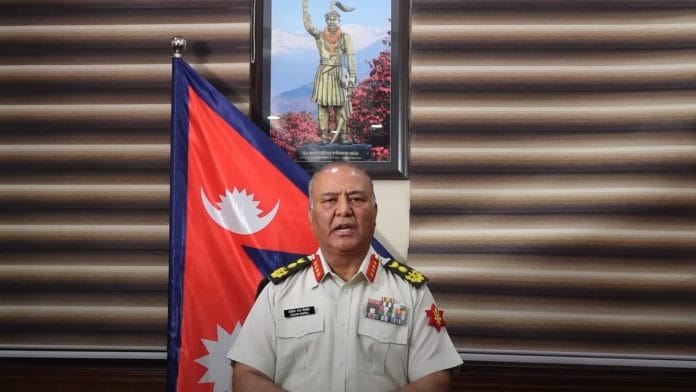General Ashok Sigdel, Nepal’s Chief of Army Staff, has thankfully stepped up to help steward a society that’s been seething with anger and reeling in shock at what it had done to its own institutions and valuable assets. Not to mention the ghastly violence inflicted by both sides of the barricades.
It is now the sole prerogative of the Nepal army to maintain those barricades, or remove them. As the sole institution to have kept its integrity intact despite years of political subterfuge and attempted interference, the Nepal army remains the surest pillar of stability and continuity.
The televised image of Gen Sigdel reassuringly addressing the people of Nepal with the portrait of King Prithvi Narayan Shah in the background is a deliberate reminder to the country about the scale of the army’s responsibility. In public memory, King Prithvi Narayan Shah is remembered as the unifier of Nepal, the one who brought together disparate fiefdoms and kingdoms to make a country. Most of all, he united various clans and raised what became today’s Nepal army, a modern professional force that has provided invaluable leadership to the country as and when it was required.
Indian media labelling that image as ‘posing in front of Hindu King’ misses the point completely, and is yet another manifestation of the deeply ingrained ignorance about Nepal. King Prithvi Narayan Shah is the founder of the Nepal army. Coupled with that is his role as the political unifier of a once deeply divided society. It is this role that the Chief of Army Staff clearly aims to fulfil after the terrible violence that engulfed the country. It is also a role the Nepal army has played before, especially during the decade-long civil war of 1996-2006.
Also Read: Coup, conspiracy & the foreign hand—What Indian TV news channels saw in Nepal this week
Army must restore the State
While his predecessors fulfilled their duties in trying circumstances, particularly with meddlesome politicians, Gen Sigdel has his task cut out for a very different role. He has to ensure peace and security in a country that has rejected the political class as a whole.
Military courses in India and China have given Gen Sigdel an exposure that would be the envy of any professional soldier. But nothing could have prepared him for the complex role that has now been thrust upon him. In fact, even the youth who drove the protests could not have prepared for what has happened in Nepal.
As one of the youthful protestors eloquently put it, none of them was aware of the scale of the protests, since the undercurrents didn’t exist. Foreign media calling it a protest against the social media ban is like a slur on Nepal’s youth, who were already seething with resentment against the corrupt political leadership. That resentment metamorphosed into rage when the first day’s peaceful protests were brutally suppressed and people’s lives were lost. Enthusiasm and hope ended in a hail of government bullets and the deaths of innocents. Retaliatory violence by the protestors then felled the government.
The meltdown of state institutions in a matter of hours is a topic that is certain to be studied in detail by centres of military education in Nepal. But that is for the future. For the present, it is vital for the Nepal army to curb outbreaks of violence anywhere by any of the protestors. After all, mobs have a dynamic of their own and are extremely difficult to control, and their fury has already swept away the institutions of State. The army, as the last resort of authority, must now restore the State.
Also Read: Nepal protest shows Gen Z believes in comeuppance—not due process
Brothers in arms
Last year, Indian President Droupadi Murmu bestowed the honorary rank of General of the Indian Army on Gen Sigdel. In doing so, New Delhi signalled great confidence in him and in the institution that he heads in Nepal — just as it did with his predecessors, and as Nepal has also done reciprocally for decades.
This is a unique relationship not visible anywhere else in the world. Despite political parties and their players in both countries doing their bit to ruffle the relationship, the two armies have maintained close bonds through every storm. The onus now is on India to support the Nepal army while it steers the country toward stability and the rule of law.
Some Indian institutions have played an intrusive role in Nepal, which has not served the national interests of either country. This has created a sense of resentment in Nepal, which remains dormant until ignited by some inane utterance or action from the Indian side. General ignorance, and specks of arrogance, have contributed to this phenomenon as well.
At this juncture it is important that Nepal gets all the help it needs, and none more so than its army. And since no one knows it better than the Indian Army, all help should be offered.
Manvendra Singh is a BJP leader, Editor-in-Chief of Defence & Security Alert, and Chairman, Soldier Welfare Advisory Committee, Rajasthan. He tweets @ManvendraJasol. Views are personal.
(Edited by Asavari Singh)






